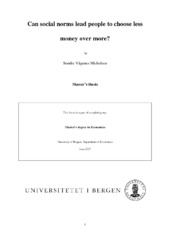Can social norms lead people to choose less money over more?
Master thesis
Permanent lenke
https://hdl.handle.net/1956/16694Utgivelsesdato
2017-07-01Metadata
Vis full innførselSamlinger
- Department of Economics [289]
Sammendrag
The point of departure for this paper is a surprising finding from an economic experiment. Tjøtta (2016) designs a more or less game, where participants are asked to choose between receiving 450 kroner or 250 kroner, conditional on winning a lottery. There is no mention of what happens to foregone money if participants choose the alternative with less money, the choice does not affect the probability of winning the lottery, and the experiment is double blinded. Unlike the dictator game, choosing less money in the more or less game does not imply more money for someone else. It is therefore very surprising that almost one third of participants in the more or less game choose less money over more. The paper examines if social norms can explain this surprising finding. Social norms have been shown to explain behavior in dictator games very well (Krupka and Weber 2013, Kimbrough and Vostroknutov 2016), can they also explain behavior in the more or less game? Two main questions are asked: (1) Does social norms differ between the more or less game and the dictator game, or do people interpret them as the same situation? (2) Can social norms explain why some people choose less money over more? To gain a better understanding of social behavior such as sharing, reciprocity, cooperation, contribution to public goods and costly punishment, it is important to understand what really motivates people to choose less money over more. Is it social norms or something else? To examine the two main questions, two economic experiments are conducted. The first experiment replicates the more or less experiment from Tjøtta (2016), with some minor alterations. The experiment includes two treatments, (1) the more or less game and (2) the dictator game. In the replication experiment, around 20 percent of participants choose less money over more in the more or less game. The second experiment elicits social norms from both the more or less game and the dictator game, using a clever elicitation method from Krupka and Weber (2013). The experiment reveals two important insights. First, social norms differ slightly between the two games, indicating that, in general, people perceive the games as two different situations. Second, social norms have a clear effect on behavior in the dictator game, while in the more or less game the effect is less clear. Even though the paper does not find a general effect of social norms on behavior in the more or less game, it does find that people’s perceptions of the social norm varies a lot. It could be possible that social norms affects some participant’s behavior in the more or less game, but to answer this specific question, further research is required. Results from both experiments are analyzed using the statistical software Stata/IC 14.1
